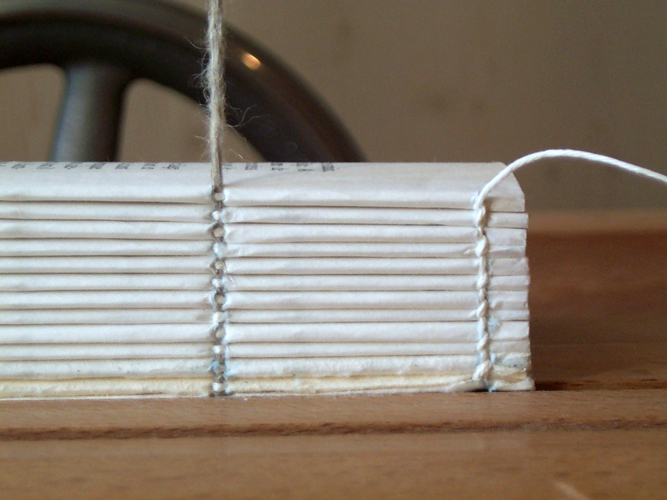
On one of my shelves at home I have a collection of old books. There’s a 1930s edition of Kristin Lavransdatter, a first edition of G.K. Chesterton’s autobiography, a crumbling copy of Archy and Mehitabel. But not all of them are great. The oldest is a history text from the 1820s that includes various marginalia, including a draft of a truly terrible poem written by a long-dead teenager to his sweetheart. Another book is from the 1880s and devoted to the quack science of phrenology. The owner of the book filled out his phrenological chart in the back, an earnest attempt to diagnose personality not too much different than many of the quizzes you see linked online. There’s another on the shelf, titled The Complete Story of the San Francisco Horror, a compilation of stories from the 1906 earthquake. After I bought it I found an envelope of World War II food rationing stamps stuck between the pages.
These books aren’t really anything special or valuable. But they are books; a physical object that can be touched, smelt, handled. They are real things, and bear the marks of previous owners and readers, passing along something more than just their text.
There are some technophile prophets who go about proclaiming the death of print; we’re told eBooks will be the future! Books are of the past! But will that ever happen?
A while back, I got in a discussion about music—specifically folk music, occasioned by the death of Pete Seeger. A large part of what made folk music boom in the way it did in the 1950s and 60s was a modern sense that there is something lost in our world, that there should be a return to an earlier, more authentic expression of culture. In different ways, that sense shows up in Pete Seeger, Bob Dylan, Tolkien, Lewis, the new urban agriculture movements, even the way we slap fake vintage filters on digital photography. It’s a powerful drive and while there’s obvious falsity and sentimentality in some expressions of it, I think the yearning for it comes from a sincere and true part of the human soul. It’s the longing for transcendence.
Transcendence is often thought of in purely spiritual or intellectual terms, but as we can see in our sacraments, the Church grounds transcendence in earthly and earthy forms: bread, wine, incense, oil, fire. Reaching beyond technology and modernity to try to grasp at physical forms that give meaning to transcendental longing is an urge that can’t really be shaken off. (That’s one reason I think more traditional approaches to the liturgy are so powerful.)
Sure, the eBook will have its place; perhaps replacing the disposable pulp paperback. And you can find elaborately worked and artistically beautiful covers for e-readers, another sign that the merely technical doesn’t satisfy. But I don’t think any serious book lover will be ever content with a non-physical copy of some of his favorite titles. We need that something to hold as we grasp at the words we read, something to feel, and something to pass along. We need “grounded transcendence”. And printed books can help fill that need.






Rob Corzine
March 27, 2014 at 3:09 pm
I concur. e-books will replace cheap paperback editions (and possibly bulky reference works). They may make reprint editions more difficult to obtain since the publisher s will bear no cost in keeping the e-book edition “available for purchase.” But they will NOT eliminate the need for bookcases.
John Herreid
March 27, 2014 at 4:24 pm
Oh, yes–reference editions are another good use for the eBook format.
As for myself, I like the cheap paperback editions since they can take a beating, fit in a pocket, and won’t cost you a hundred dollars if you accidentally leave them on the bus. I have friends and family who prefer the eBook format for various reasons (visual impairment, ease of portability, etc.) but like I said, I doubt that print will ever disappear.
Gerard Williams
March 28, 2014 at 9:24 am
Print is generally cheaper than eBooks… most of the time if I want a book I can look on the kindle store and it will be listed there for $10-$15, but when I go to half price books I find it there for $3-$5. It’s a wonder that anyone uses eBooks at that rate… unless you just like spending more money. You can’t buy “used” ebooks.
carleolson
April 3, 2014 at 12:43 pm
John: Good thoughts, thank you! I was given a Kindle for Christmas a couple of years ago. At first, I went nuts downloading all sorts of cheap books (and not so cheap books). I used it daily. Then I started using it every other day. As of this writing, I haven’t used it for two months. Yes, it is great for traveling (and I haven’t been traveling), and it has some other strengths, but it also comes with many frustrations, among them the inability to handle, skim, seek, and engage with in the way you are able to with a real book.
John Herreid
April 3, 2014 at 12:48 pm
I downloaded a number of books to my iPhone and read a couple on my commute… and then it petered out much as you describe. I also like to loan books to people and it’s just easier to hand someone a physical copy than to go through the rigamarole of trying to figure out if and how you can lend an eBook.